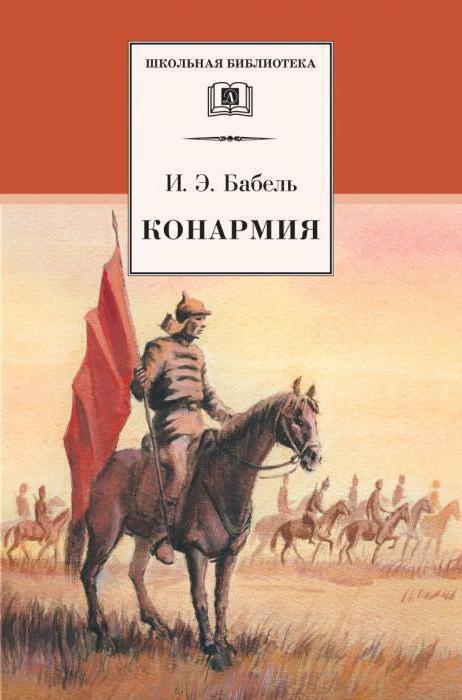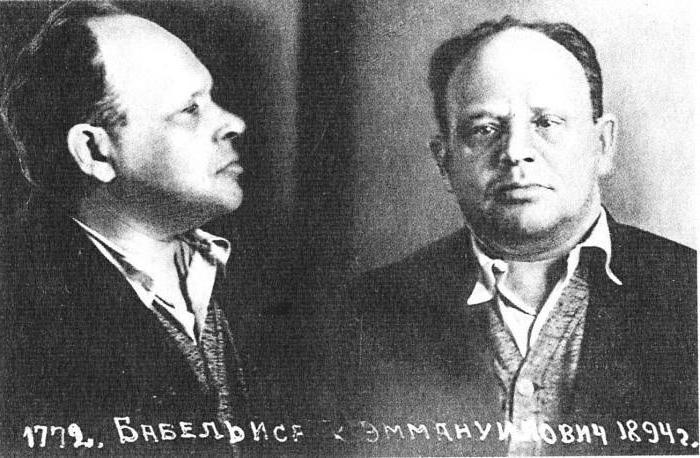Babel Isaac Emmanuilovich, whose biography is presented in the article, is a prose writer, translator, playwright, essayist. His real name is Bobel, and he is also known under the pseudonyms Bab-El and K. Lyutov. This man was shot by the Bolsheviks in 1940. In 1954, Isaac Babel was posthumously rehabilitated.
His biography begins on June 30 (July 12), 1894. It was then that Isaac Emanuilovich was born in Odessa. His father was Emanuel Isaakovich Bobel.
Childhood, study period
In the early childhood years, the future writer lived in Nikolaev, near Odessa. At the age of 9, he entered the local Commercial College named after Count Witte. A year later he transferred to the Odessa Commercial College named after Nicholas I. Babel graduated from it in 1911. His training in playing the violin dates back to this time. Lessons to Babel were given by P.S. Stolyarsky, a famous musician. Also, the future writer was fond of the works of French authors. At the insistence of his religious father, at the same time, Babel seriously began to study the Hebrew language. He read Jewish holy books. Isaac Emanuilovich received the title of honorary citizen after successfully completing his studies at the Odessa Commercial School. Then he applied for admission to the economic department of the Kiev Commercial Institute. Babel was admitted to the institute and lived in Kiev for several years. He graduated with honors in 1916, receiving the title of candidate.
The first printed work, life in Saratov
In the Kiev magazine "Lights" was published the first work of Babel - the story "Old Shloime". After the outbreak of the Russian-German war, Isaac Emanuelovich was enlisted in the militia, but did not take part in hostilities.
In 1915, Babel was enrolled in the fourth year of the Petrograd Psychoneurological Institute (Faculty of Law). However, he did not graduate from this institution. In 1915, Babel was in Saratov for some time. Here he created a story called "Childhood. At Grandma's", after which he returned to Petrograd.
First meeting with M. Gorky
The meeting with Maxim Gorky took place in the autumn of 1916 in the editorial office of the Chronicle magazine. In November 1916, two stories of Babel were published in this journal - "Mama, Rimma and Alla" and "Elya Isaakovich and Margarita Prokofievna." In the same year, in the Journal of Magazines, the Petrograd edition, a series of essays appeared, united under the name My Leaflets.
In the Autobiography created in 1928, Isaac Emmanuilovich, speaking of his first meeting with Gorky, noted that he owed everything to her and still pronounces the name of this writer with gratitude and love.
Babel's life "in people"
I.E. Babel, whose biography is marked by friendship with M. Gorky, wrote that he taught him very important things, and then, when it turned out that several of his youthful experiments were accidental luck, that he wrote poorly, Maxim Gorky sent him "to the people." Babel noted in his Autobiography that he had "gone into the people" for 7 years (1917-24). At that time he was a soldier, was on the Romanian front. Babel also worked in the foreign department of the Cheka as a translator. In 1918, his texts were published in the New Life newspaper. In the same year, in the summer, Isaac Babel took part in food expeditions organized by the People's Commissariat of Food.
In the period from the end of 1919 to the beginning of 1920, Isaac Babel lived in Odessa. A brief biography of the writer is supplemented by new important events. The writer served in the State Publishing House of Ukraine, where he headed the editorial and publishing department. In the spring of 1920, under the name of Lyutov Kirill Vasilievich, correspondent of Yugrost, Isaac Emmanuilovich went to the First Horse Army. He stayed here for several months. The writer kept diaries, and also published his essays and articles in the newspaper "Red cavalryman." After typhus, in late 1920, Isaac Emmanuilovich returned to Odessa.
New publications, life in Moscow
In the years 1922-1923. Babel began to actively publish his stories in Odessa newspapers (The Sailor, Izvestia and Silhouettes), as well as in the Lava magazine. Among these works, the following stories should be noted: "The King", included in the cycle "Odessa Tales", and "Grishuk" (cycle "Konarmia"). Almost all of 1922, Babel lived in Batumi. His biography was also marked by a visit to other Georgian cities.
In 1923, the writer established relations with Moscow writers. He began to be published in Krasnaya Novi, Lefa, Searchlight, and Pravda (Odessa Tales and short stories from Konarmia). While in Odessa, Isaac Emmanuilovich met with Vladimir Mayakovsky. Then, after Babel finally moved to Moscow, he made acquaintance with many writers who were here - with A. Voronsky, S. Yesenin, D. Furmanov. Note that the first time Isaac Emanuelovich lived in Sergiev Posad (near Moscow).
Popularity, creativity of the second half of the 1920s
In the mid-1920s, he became one of the most popular writers in the USSR. Only in 1925, three collections of his stories were released as a separate publication. The first set of short stories created by Babel from Konarmia was published the following year. In the future, he replenished. Isaac Babel planned to write 50 short stories, but 37 were published, the last of which is called Argamak.
In 1925, Isaac Emanuelovich began to work on the creation of the script “Benya Creek”, and also completed the play “Sunset”. In the second half of the 1920s, Isaac Babel wrote (at least published) almost all of his best works. The next 15 years of Babel’s life added only very little to this basic of his legacy. In the years 1932-33, Isaac Emanuelovich worked on the play "Maria". He created a number of new “Konarmeyskie” short stories, as well as stories, mostly autobiographical (“Guy de Maupassant”, “Awakening”, etc.). At this time, the writer also completed the screenplay "Wandering Stars" based on the prose of Sholom Aleichem.
"Conarmia"

In the mid-1920s, his entry into literature was sensational. Babel’s novels of “Conarmia” were distinguished by the straightforwardness and severity of the depiction of atrocities and bloody events of the Civil War period, even unusual for that time. Moreover, his works are characterized by a rare grace of the word, sophistication of style. Babel, whose biography indicates that he was familiar with the Civil War firsthand, conveys its bloody events with particular sharpness. Three cultural strata were involved in them, hardly intersecting in Russian history before. We are talking about the Jews, the Russian intelligentsia and the people. The effect of this clash forms the moral and artistic world of Babel's prose, full of hope and suffering, insights and tragic mistakes. The Konarmia immediately provoked a very sharp controversy, within the framework of which various points of view clashed. In particular, the commander of the First Horse S.M. Budyonny perceived this work as slander against the reds. But A. Voronsky and M. Gorky believed that the depth of the image of human fate in the conflicts of the Civil War, though not propaganda, is the main task of the writer.
"Odessa stories"
Babel in his Odessa Stories depicted the romanticized Odessa Moldavian. Her soul was Benya Creek, a "noble" bandit. In the book, the life of Odessa merchants and raiders, dreamers and sages is very colorful, lyrically and ironically-pathetically presented. He is depicted as a passing era. "Odessa Stories" (the play "Sunset" became a variant of the plots of the second book) are one of the most significant events in Russian literature of the mid-20s of the last century. They had a great influence on the work of a number of writers, among them I. Ilf and E. Petrov.
Travels around the USSR and foreign trips
Since 1925, Isaac Emmanuilovich travels a lot around the USSR (southern Russia, Voronezh province, Kiev, Leningrad). He collects materials about the recent events of the Civil War, serves as secretary of the village council in the village of Molodenovo, located on the Moscow River. In the summer of 1927, Babel first went abroad. His biography was first marked by a trip to Paris, and then to Berlin. Departures abroad from this time become almost annual until 1936. In 1935, Isaac Emmanuilovich presented a report in defense of culture at the Paris Congress of Writers.
Meetings with Gorky
Many times, Babel met with Maxim Gorky, who closely followed his work and supported him in every possible way. After the death of Gorky’s son, Maxim Peshkov, Alexei Maximovich invited Isaac Emanuilovich to his place in Gorki. Here he lived from May to June 1934. In the same year, in August, Babel made a speech during the I All-Union Congress of Soviet Writers.
Babel: biography and creativity of the second half of the 1930s.
In the second half of the 1930s, the work of Isaac Emanuelovich was mainly connected with the literary processing of the work of other writers. In particular, Babel worked on the following screenplays: on the work "How Steel Was Tempered" by N. Ostrovsky, on the poem "The Duma of Opanas" by Vs. Bagritsky, as well as over the script of the film about Maxim Gorky. He also created an adaptation of the work of Turgenev for cinema. We are talking about the script of the film called "Bezhin Meadow" for S.M. Eisenstein. This film, I must say, was banned and destroyed as "ideologically vicious." However, this did not break such a writer as Isaac Babel. His biography and creativity indicate that he did not pursue fame.
In 1937, Isaac Emmanuilovich announced in the press that he was finishing work on the play about G. Kotovsky, and two years later, on the script “Old Square”. During the life of the writer, however, not one of these works was published. In the fall of 1936, the last collection of his stories was published. Babel’s last appearance in print is New Year’s wishes, which were published on December 31, 1938 in Literaturnaya Gazeta.
Arrest, execution and rehabilitation
Babel’s biography by dates continues with the fact that on May 15, 1939, a search was carried out at Isaak Emanuilovich’s Moscow apartment, as well as at his dacha located in Peredelkino (where he was at that time). During the search, 24 folders with his manuscripts were seized. Subsequently, they were not found in the FSK archives. On June 29-30, after a series of continuous interrogations, Babel testified. Subsequently, in several statements, he refused them. In a speech delivered at the trial, Isaac Emanuelovich asked for an opportunity to complete his last works. However, he was not destined to do so. Isaac Emanuilovich was sentenced to death. On January 27, 1940, Babel was executed. His brief biography ends with the fact that the writer's body was cremated on the same day in the Donskoy Monastery.

After 14 years, in 1954, Isaac Emanuilovich was completely rehabilitated, since the crime was not found in his actions. After that, disputes around his fate and work resumed. They do not stop to this day. Babel, whose biography and work we examined, is a writer whose works are certainly worth getting acquainted with.